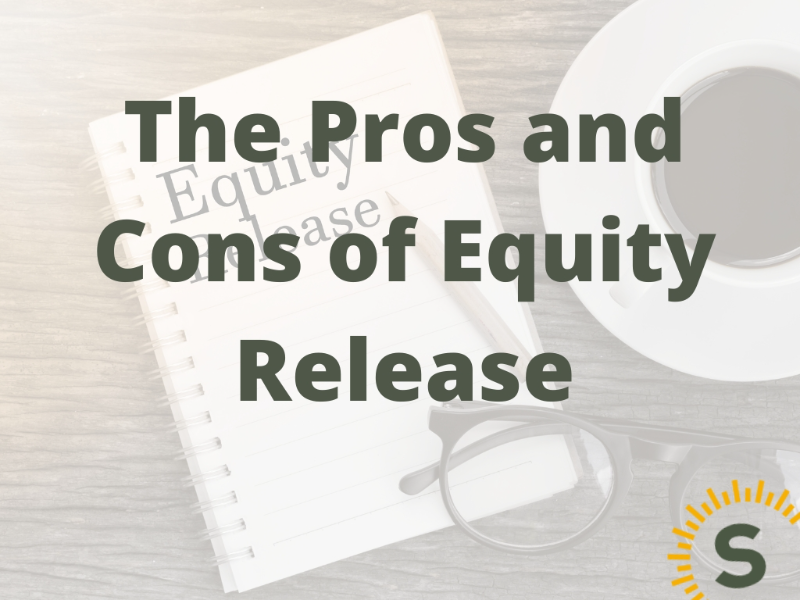
If you're looking for Equity release advice, one place you may be thinking to look is your bank. However you may have been left wondering, do Banks do equity release?
Equity release has become an increasingly popular financial solution for homeowners aged 55 and over who want to unlock the value tied up in their property without having to sell or move.
In this insight, we will delve into the history of equity release products offered by banks, discuss why some banks have ventured into the market and then withdrawn, and provide an overview of the current equity release market.
While only a few UK banks, such as Lloyds Banking Group and Nationwide, offer Equity Release products, it's recommended to consult an Equity Release broker to explore a wider range of options. An experienced broker can help you find the best-suited equity release solution tailored to your needs.
As of now, only Lloyds Banking Group and Nationwide Building Society offer equity release products, and their offerings are limited. Most banks, such as Santander, HSBC, and NatWest, do not offer equity release and will instead refer customers to an equity release adviser with whom they have a business agreement. It's essential to remember that such referred firms may have restricted access to lenders and products, known as tied advice.
For a more comprehensive range of options, consider speaking with a specialist equity release company.
If you're unsure where to start with seeking equity release advice, complete the Sunny Fact Find. The answers you provide help us to find the best-suited adviser for your needs. Your adviser contacts you for a no-obligation chat, explaining how they can help, you decide how to proceed.
To find out how much equity you could potentially release, try our Equity Release Calculator.
In the 1990s, banks like Barclays and Bank of Scotland introduced equity release with Shared Appreciation Mortgages (SAMs). SAMs allowed elderly homeowners to avoid monthly payments but left them with limited equity when property values surged in the 2000s.
The idea was to offer elderly homeowners a mortgage with no monthly payments, but instead, the banks would take a share in the future rise in the property value. Unfortunately, this led to many pensioners finding it difficult to move house when property values soared in the 2000s.
In the past decade, a few more banks have dipped their toes into the equity release market, such as NatWest/Royal Bank of Scotland and HSBC, but ultimately withdrew their products. One key factor in their decisions has been the importance of offering independent advice and a diverse range of products to customers, which many banks have struggled to achieve.
The equity release market has changed over the decades, with the two main products now being lifetime mortgages and home reversion plans.
The majority of high street banks do not offer equity release. A few banks entered the market to later withdraw from it.
In 2006, NatWest/RBS entered the equity release market, offering products to long-time bank customers and retired bank staff. However, by 2009, after significant investment in back-office infrastructure and a surge in recruitment, RBS ran out of funds and closed its equity release operations.
HSBC also ventured into the equity release market in 2006, partnering with the now-defunct In Retirement Services. This decision was met with confusion as In Retirement Services was a non-independent equity release company. Their relationship ended when In Retirement Services went into administration in 2009 due to funding issues.
Building societies have experienced greater success in offering equity release products, although none have remained in the market consistently. Many building societies were impacted by the credit crunch over a decade ago, which affected their ability to raise funds and forced them to focus on more profitable products such as traditional mortgages.
Northern Rock, Bristol & West, and Saffron Building Society were among the building societies that attempted to offer equity release products but ultimately withdrew from the market. Northern Rock's equity release book was eventually sold to Papilio UK Equity Release Mortgages.
One interesting, albeit short-lived, product was launched by Godiva. They were the first to introduce an equity release plan with no early repayment charges. While this product is no longer available, the Hodge Flexible Lifetime Mortgage Plan offers some similar features.
The current equity release market is diverse and competitive, dominated by insurance companies, finance houses, and private companies. While high street banks do not currently offer equity release products, these notable providers offer various plans with unique features and benefits, catering to different homeowner needs.
| Provider | Product Name | USP |
|---|---|---|
| Aviva | Lifestyle Flexible Option | Lowest interest rate currently in the market, with free valuation and cashbacks |
| Stonehaven | Interest Select Plan | Interest-only lifetime mortgage, monthly payments help maintain a level balance |
| More2life | Enhanced Lifetime Mortgage | Offers maximum release based on ill-health, the more severe the health condition, the higher the release |
| Hodge Lifetime | Flexible Drawdown Plan | Allows repayment of up to 10% of the balance each year, and no early repayment charges after 5 years if downsizing |
While high street banks may not be prominent players in the equity release market, several well-known insurance companies offer equity release products, including:
These companies may not always use their funds, and many have funders backing their products.
Determining the best company for equity release depends on individual needs and circumstances. It's recommended to consult with an experienced equity release broker who can assess your specific requirements and provide tailored recommendations. Some reputable equity release providers in the UK include Aviva, Legal & General, Just Group, and Retirement Advantage. Working with a broker allows you to compare offerings from multiple providers and choose the one that best suits your financial goals and preferences. They can guide you through the process, ensuring you make an informed decision about the equity release solution that is right for you.
The primary reason that more high street banks do not offer equity release products is that they lack the means to fund these ventures due to the nature of their business. Banks typically cannot use their customers' current accounts or savings to fund equity release products, as these funds are often offset by other products.
Additionally, banks are regulated by both the Financial Conduct Authority (FCA) and the Prudential Regulation Authority (PRA). The PRA sets strict guidelines on how much of a bank's "books" can be assigned to different assets, making it difficult for banks to enter the equity release market even if they wanted to.
All equity release lenders approved and regulated by the Financial Conduct Authority (FCA) and members of the Equity Release Council can be trusted. These lenders adhere to the Equity Release Council's SHIP (Safe Home Income Plans) Standards, which provide additional protections for customers.
While it may be surprising that more high street banks do not offer equity release products, the current market is diverse and competitive, with a wide range of plans and interest rates available to homeowners. For those considering equity release, it is essential to research the market thoroughly and consult with a specialist equity release company to ensure you find the best solution for your needs and circumstances.
So, do banks do equity release? While the answer may not be a resounding "yes," there are plenty of alternative options in the market for those interested in unlocking the value of their property. If that is enough to put you off of releasing equity, there are plenty of alternatives to consider.

Stuart is an expert in Property, Money, Banking & Finance, having worked in retail and investment banking for 10+ years before founding Sunny Avenue. Stuart has spent his career studying finance. He holds qualifications in financial studies, mortgage advice & practice, banking operations, dealing & financial markets, derivatives, securities & investments.
 No minimum
No minimum  Leyland, Lancashire
Leyland, Lancashire No obligation consultation
No obligation consultation
 No minimum
No minimum  No obligation consultation
No obligation consultation
 No minimum
No minimum  Free Consultations
Free Consultations
 No minimum
No minimum  No obligation consultation
No obligation consultation
 No minimum
No minimum  Initial fee free consultation
Initial fee free consultation
 No minimum
No minimum  Initial fee free consultation
Initial fee free consultation
 £51,000+
£51,000+  Free Consultations
Free Consultations
 No minimum
No minimum  Initial fee free consultation
Initial fee free consultation
 £101,000+
£101,000+  Bishop's Stortford, Hertfordshire
Bishop's Stortford, Hertfordshire No obligation consultation
No obligation consultation
 No minimum
No minimum  Initial or Ongoing Consultation Fees
Initial or Ongoing Consultation Fees
 No minimum
No minimum  Initial fee free consultation
Initial fee free consultation
 No minimum
No minimum  Initial fee free consultation
Initial fee free consultation
 £51,000+
£51,000+  Sheffield, South Yorkshire
Sheffield, South Yorkshire No obligation consultation
No obligation consultation
 No minimum
No minimum  No obligation consultation
No obligation consultation
 No minimum
No minimum  Newcastle-under-Lyme, Staffordshire
Newcastle-under-Lyme, Staffordshire Free Consultations
Free Consultations
 No minimum
No minimum  Free Consultations
Free Consultations
 No minimum
No minimum  No obligation consultation
No obligation consultation
 No minimum
No minimum  No obligation consultation
No obligation consultation
 No minimum
No minimum  Free Consultations
Free Consultations
 No minimum
No minimum  No obligation consultation
No obligation consultation
 No minimum
No minimum  Coatbridge, Lanarkshire
Coatbridge, Lanarkshire Initial or Ongoing Consultation Fees
Initial or Ongoing Consultation Fees
 No minimum
No minimum  Initial or Ongoing Consultation Fees
Initial or Ongoing Consultation Fees
 £21,000 +
£21,000 +  Initial fee free consultation
Initial fee free consultation
 London, Greater London
London, Greater London No obligation consultation
No obligation consultation
 No minimum
No minimum  No obligation consultation
No obligation consultation





Our website offers information about financial products such as investing, savings, equity release, mortgages, and insurance. None of the information on Sunny Avenue constitutes personal advice. Sunny Avenue does not offer any of these services directly and we only act as a directory service to connect you to the experts. If you require further information to proceed you will need to request advice, for example from the financial advisers listed. If you decide to invest, read the important investment notes provided first, decide how to proceed on your own basis, and remember that investments can go up and down in value, so you could get back less than you put in.
Think carefully before securing debts against your home. A mortgage is a loan secured on your home, which you could lose if you do not keep up your mortgage payments. Check that any mortgage will meet your needs if you want to move or sell your home or you want your family to inherit it. If you are in any doubt, seek independent advice.